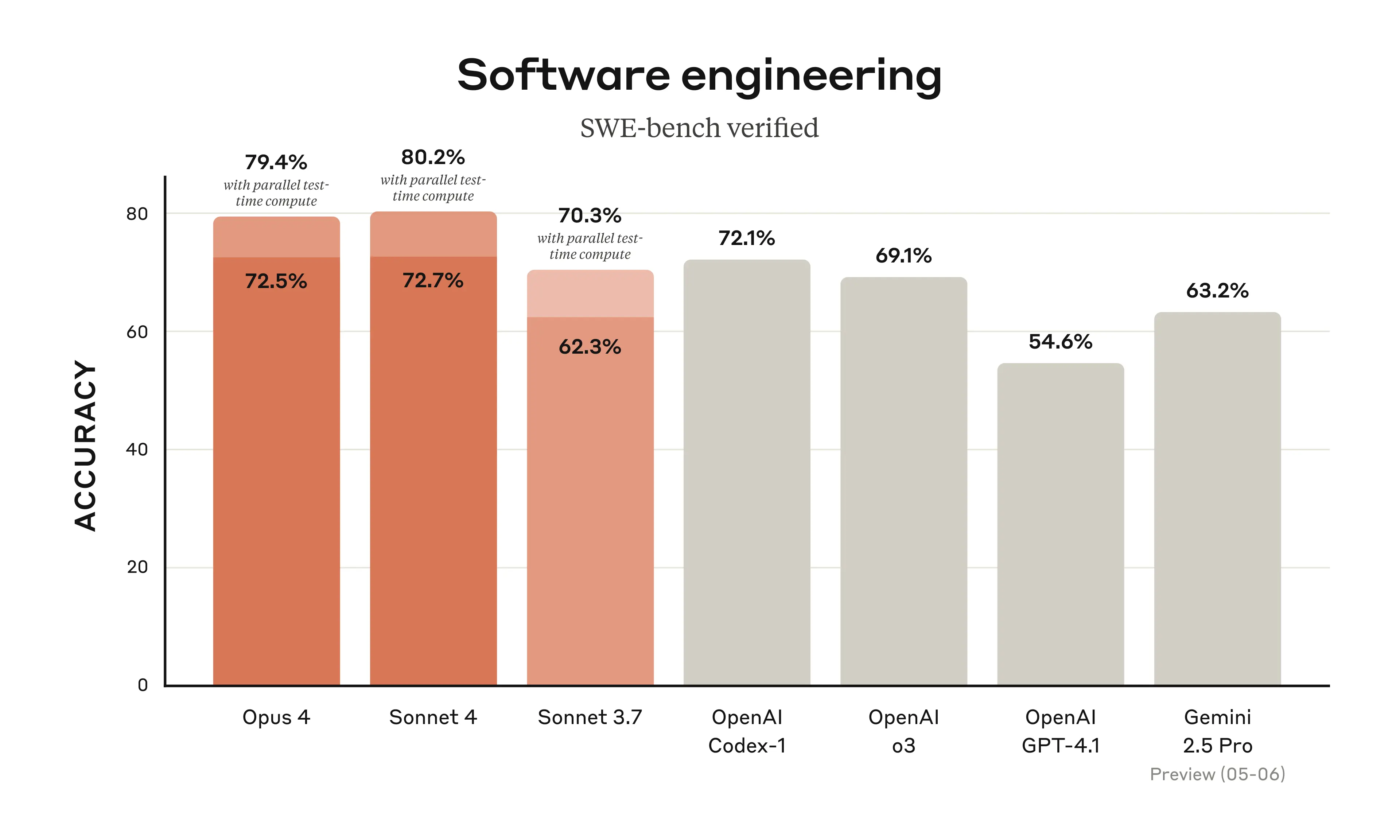Claude 4: A Comprehensive Guide to Anthropic’s Next-Gen AI Models and API Innovations

Introduction: Why Claude 4 Matters for Developers and Enterprises
Anthropic’s 2025 release of Claude Opus 4 and Claude Sonnet 4 represents a quantum leap in AI capabilities:
-
Opus 4 achieves 72.5% on SWE-bench, setting new standards for coding proficiency -
Sonnet 4 delivers 30% faster reasoning than its predecessor -
Enhanced tool orchestration enables multi-hour autonomous workflows
This guide explores practical implementations, migration strategies, and API innovations for technical teams.
Part 1: Core Technical Advancements in Claude 4
1.1 Dual Model Architecture: Opus 4 vs Sonnet 4
| Feature | Opus 4 | Sonnet 4 |
|---|---|---|
| Primary Use | Complex problem-solving | High-efficiency operations |
| Response Speed | Slower (deep analysis) | Real-time responses |
| Benchmark Score | 72.5% SWE-bench | 72.7% SWE-bench |
| Pricing | $15/$75 per million tokens | $3/$15 per million tokens |
Real-World Applications:
-
Cursor IDE uses Opus 4 for cross-file refactoring with 0.2% error rate -
GitHub Copilot integrates Sonnet 4 for next-gen code suggestions
1.2 Three Revolutionary Improvements
1.2.1 Enhanced Toolchain Capabilities
-
Parallel Tool Execution: Simultaneous web search + code execution + file editing -
Persistent Memory System: Opus 4 auto-generates navigation guides when granted file access (Example) -
Thought Summarization: Condenses lengthy reasoning into key insights
1.2.2 Safety & Control
-
New Refusal Mechanism: Returns refusalstatus for policy violations -
Reduced Shortcut Behavior: 65% fewer workaround attempts vs Sonnet 3.7
1.2.3 Developer Experience
-
Native IDE Integration: Real-time code edits in VS Code/JetBrains -
Claude Code SDK: Automated PR reviews via GitHub Actions
Part 2: Migrating from Claude 3.7 to Claude 4
2.1 Essential Migration Steps
-
Update Model Identifiers # Legacy model = "claude-3-7-sonnet-20250219" # Current model = "claude-sonnet-4-20250514" # or claude-opus-4-20250514 -
Handle API Changes -
Remove deprecated headers: # Obsolete headers - "anthropic-beta: token-efficient-tools-2025-02-19" - "anthropic-beta: output-128k-2025-02-19" -
Implement refusal handling: if (response.stop_reason === "refusal") { handlePolicyViolation(); }
-
2.2 Critical Implementation Notes
-
Text Editor Updates: -
Old: text_editor→ New:str_replace_based_edit_tool -
undo_editcommand discontinued
-
-
Reasoning Modes: -
Instant Mode: Simple Q&A -
Extended Thinking (Beta): Interleaved tool use & multi-turn dialog
-
Part 3: Mastering the New API Capabilities
3.1 Four Groundbreaking Features
| Feature | Technical Specs | Use Case Examples |
|---|---|---|
| Code Execution | Python sandbox environment | Auto-generate sales dashboards |
| MCP Connector | Serverless third-party integration | Asana task management sync |
| Files API | Cross-session file persistence | Multi-stage document analysis |
| Prompt Caching | 60-minute context retention | 90% cost reduction in workflows |
3.2 Case Study: Building a Financial Analysis Agent
graph TD
A[Upload PDF Reports] --> B[Files API Storage]
B --> C[Code Execution Data Cleaning]
C --> D[MCP→Asana Task Creation]
D --> E[Generate Visualizations]
E --> F[Cached Context for Future Analysis]
Results:
-
Data processing time reduced from 3 hours to 15 minutes -
Chart iterations automatically linked to project tasks
Part 4: Frequently Asked Questions (FAQ)
Q1: What’s available for free users?
-
Sonnet 4: Basic Q&A & simple coding -
Extended Thinking: Pro/Max/Team/Enterprise plans only
Q2: How to avoid refusals?
-
Avoid requests involving: Medical advice/Financial transactions -
Use explicit system prompts: [Act as code editor assistant - no business decisions]
Q3: Code execution pricing?
-
Free Tier: 50 container-hours/day -
Overage: $0.05/container-hour -
Optimization: Combine with 1-hour prompt caching
Part 5: Developer Best Practices
5.1 Performance Optimization
-
Hybrid Workflow Routing: -
Simple tasks → Sonnet 4 -
Complex analysis → Opus 4
-
-
File Preprocessing: files.upload( file=open("report.pdf", "rb"), metadata={"category": "finance", "version": "2025Q2"} ) -
Caching Strategies: -
High-frequency queries: 1-hour cache -
Dynamic data: Default 5-minute TTL
-
5.2 Troubleshooting Guide
| Symptom | Likely Cause | Solution |
|---|---|---|
| Slow responses | Opus 4 for simple tasks | Switch to Sonnet 4 |
| Tool execution failure | MCP connection timeout | Retry on 5xx server errors |
| Stale memory files | Missing file permissions | Enable allow_local_files=true |
Conclusion: The Future of AI Development with Claude 4
Claude 4 redefines human-AI collaboration through Opus 4’s analytical depth and Sonnet 4’s operational efficiency. Developers can leverage these innovations to:
-
Build knowledge management systems using Files API -
Create hybrid workflows combining instant/expanded modes -
Integrate automation platforms via MCP connectors
Get Started: Claude Console | API Documentation
“
Content based on official Anthropic technical documentation (May 2025)
Sources:”
